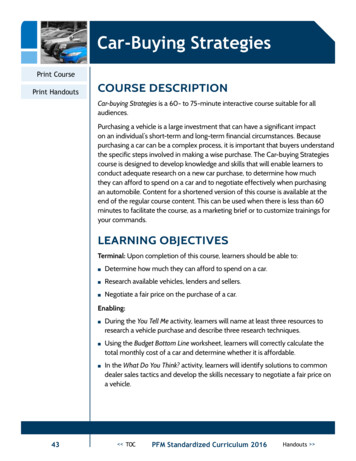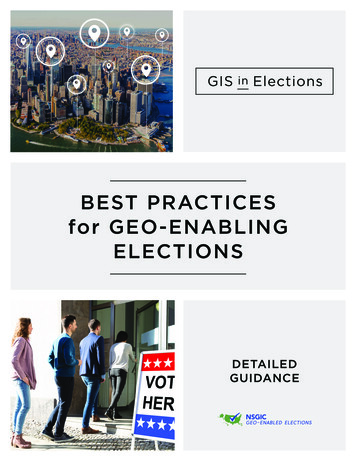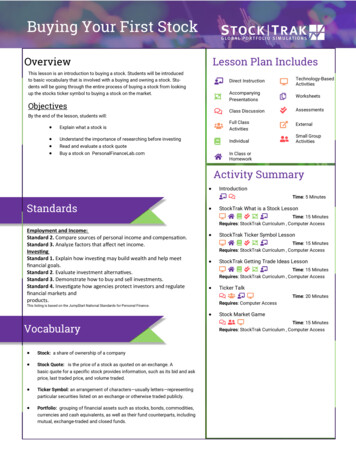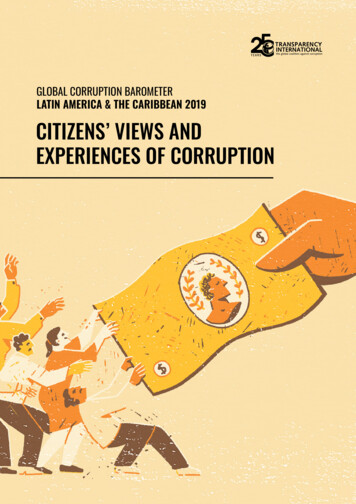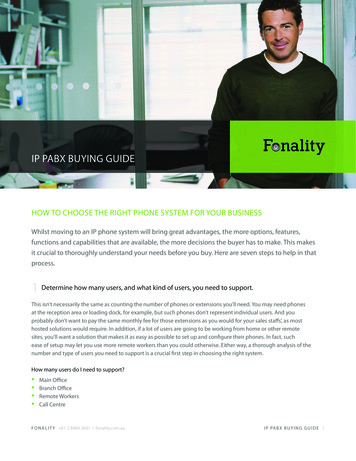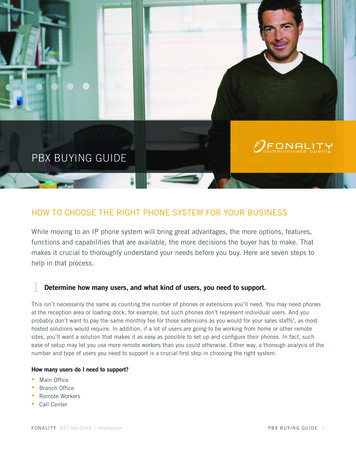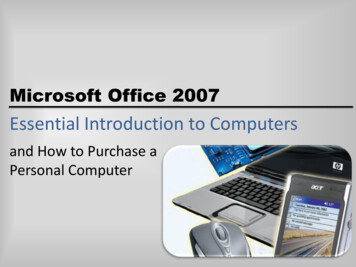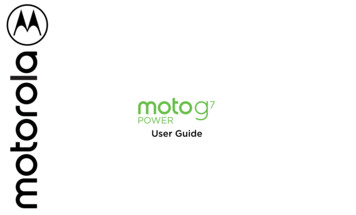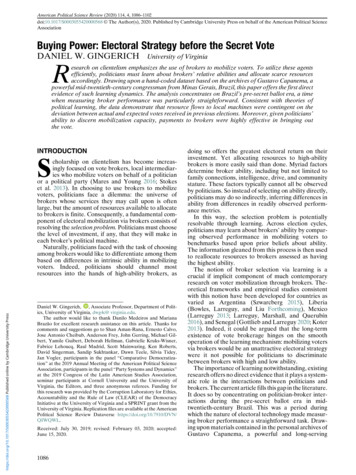
Transcription
American Political Science Review (2020) 114, 4, 1086–1102doi:10.1017/S0003055420000568 The Author(s), 2020. Published by Cambridge University Press on behalf of the American Political ScienceAssociationBuying Power: Electoral Strategy before the Secret VoteDANIEL W. GINGERICHUniversity of VirginiaResearch on clientelism emphasizes the use of brokers to mobilize voters. To utilize these agentsefficiently, politicians must learn about brokers’ relative abilities and allocate scarce resourcesaccordingly. Drawing upon a hand-coded dataset based on the archives of Gustavo Capanema, apowerful mid-twentieth-century congressman from Minas Gerais, Brazil, this paper offers the first directevidence of such learning dynamics. The analysis concentrates on Brazil’s pre-secret ballot era, a timewhen measuring broker performance was particularly straightforward. Consistent with theories ofpolitical learning, the data demonstrate that resource flows to local machines were contingent on thedeviation between actual and expected votes received in previous elections. Moreover, given politicians’ability to discern mobilization capacity, payments to brokers were highly effective in bringing outthe 420000568 Published online by Cambridge University Presscholarship on clientelism has become increasingly focused on vote brokers, local intermediaries who mobilize voters on behalf of a politicianor a political party (Mares and Young 2016; Stokeset al. 2013). In choosing to use brokers to mobilizevoters, politicians face a dilemma: the universe ofbrokers whose services they may call upon is oftenlarge, but the amount of resources available to allocateto brokers is finite. Consequently, a fundamental component of electoral mobilization via brokers consists ofresolving the selection problem. Politicians must choosethe level of investment, if any, that they will make ineach broker’s political machine.Naturally, politicians faced with the task of choosingamong brokers would like to differentiate among thembased on differences in intrinsic ability in mobilizingvoters. Indeed, politicians should channel mostresources into the hands of high-ability brokers, asDaniel W. Gingerich,, Associate Professor, Department of Politics, University of Virginia, dwg4c@ virginia.edu.The author would like to thank Danilo Medeiros and MarianaBrazão for excellent research assistance on this article. Thanks forcomments and suggestions go to Shan Aman-Rana, Ernesto Calvo,Jose Antonio Cheibub, Anderson Frey, John Gerring, Michael Gilbert, Yamile Guibert, Deborah Hellman, Gabrielle Kruks-Wisner,Fabrice Lehoucq, Raul Madrid, Scott Mainwaring, Ken Roberts,David Singerman, Sandip Sukhtankar, Dawn Teele, Silvia Tidey,Jan Vogler, participants in the panel “Comparative Democratization” at the 2019 Annual Meeting of the American Political ScienceAssociation, participants in the panel “Party Systems and Dynamics”at the 2019 Congress of the Latin American Studies Association,seminar participants at Cornell University and the University ofVirginia, the Editors, and three anonymous referees. Funding forthis research was provided by the Corruption Laboratory for Ethics,Accountability and the Rule of Law (CLEAR) of the DemocracyInitiative at the University of Virginia and a SPRINT grant from theUniversity of Virginia. Replication files are available at the AmericanPolitical Science Review Dataverse https://doi.org/10.7910/DVN/QIWQWL.Received: July 30, 2019; revised: February 03, 2020; accepted:June 15, 2020.1086doing so offers the greatest electoral return on theirinvestment. Yet allocating resources to high-abilitybrokers is more easily said than done. Myriad factorsdetermine broker ability, including but not limited tofamily connections, intelligence, drive, and communitystature. These factors typically cannot all be observedby politicians. So instead of selecting on ability directly,politicians may do so indirectly, inferring differences inability from differences in readily observed performance metrics.In this way, the selection problem is potentiallyresolvable through learning. Across election cycles,politicians may learn about brokers’ ability by comparing observed performance in mobilizing voters tobenchmarks based upon prior beliefs about ability.The information gleaned from this process is then usedto reallocate resources to brokers assessed as havingthe highest ability.The notion of broker selection via learning is acrucial if implicit component of much contemporaryresearch on voter mobilization through brokers. Theoretical frameworks and empirical studies consistentwith this notion have been developed for countries asvaried as Argentina (Szwarcberg 2015), Liberia(Bowles, Larreguy, and Liu Forthcoming), Mexico(Larreguy 2013; Larreguy, Marshall, and Querubín2016), and Senegal (Gottlieb and Larreguy 2020; Koter2013). Indeed, it could be argued that the long-termexistence of vote brokerage hinges on the smoothoperation of the learning mechanism: mobilizing votersvia brokers would be an unattractive electoral strategywere it not possible for politicians to discriminatebetween brokers with high and low ability.The importance of learning notwithstanding, existingresearch offers no direct evidence that it plays a systematic role in the interactions between politicians andbrokers. The current article fills this gap in the literature.It does so by concentrating on politician-broker interactions during the pre-secret ballot era in midtwentieth-century Brazil. This was a period duringwhich the nature of electoral technology made measuring broker performance a straightforward task. Drawing upon materials contained in the personal archives ofGustavo Capanema, a powerful and long-serving
https://doi.org/10.1017/S0003055420000568 Published online by Cambridge University PressBuying Power: Electoral Strategy before the Secret Votelegislator from the state of Minas Gerais, the articleoffers direct evidence that learning about broker abilityguides the allocation of politicians’ campaign resources.Specifically, the article makes use of detailed tablesconstructed by Capanema over multiple election cyclesto show how learning about the efficacy of local votebrokers guided expenditures on municipal machines.The data reveal that Capanema allocated funds tothe municipal machines of brokers in accord with thedegree to which they exceeded (or fell below) expectations for vote mobilization in previous elections. Thearticle is able to demonstrate this explicitly, as Capanema left a documentary record of both his expectedvotes (given deals with brokers) as well as the votes heactually received across municipalities in Minas Gerais.In terms of raw spending, I estimate that for every voteabove (below) Capanema’s expected amount for agiven municipal machine, he allocated the equivalentof US 1.84 (in 1990 dollars) more (less) to the machinein the subsequent election. Moreover, the study findsevidence of a rational and proportionate belief updating process. Capanema’s expenditure decisions reactedmore strongly to deviations from expectations formachines that did not have previous records of successin mobilizing the vote for him than for those that didhave such a record.The evidence that campaign expenditures flowed tomore competent brokers implies that money was utilized efficiently, and thus likely to have an appreciableeffect on votes. To ascertain whether this was the case,the article employs a first differences estimator toexamine the impact of changes in spending on brokerson changes in votes. It finds that the returns to spendingon brokers were indeed high. One vote cost approximately US 14 (in 1990 dollars). This is a level ofelectoral productivity in spending that is orders ofmagnitude higher than that indicated by records of votebuying in nineteenth-century Britain or contemporarystudies of electoral expenditures in the US. Importantly, the effect of spending on brokers cannot beexplained away by antecedent trends: placebo regressions reveal no relationship between prior changes inCapanema’s votes and subsequent changes in spending.The high returns to spending on brokers in theBrazilian case is somewhat surprising, as the country’spolitical parties are often characterized as weak(cf. Mainwaring 1999). Strong parties can be instrumental in motivating broker performance, as they offerrelatively stable career paths along which successfulbrokers can advance (Stokes et al. 2013; Szwarcberg2015). Yet the findings of the article demonstrate thatemploying brokers can be an effective electoral strategy even in settings of party weakness, provided twoconditions are met. First, as described in previous work,there must be reliable performance measures by whichto gauge success. In the pre-secret ballot era in Brazil,vote counts at the municipal-level could be used for thispurpose, since voters in many areas could not vote for agiven candidate unless his ballots were allocated tothem by a local broker. Second, repeated interactionsmust take place between brokers and politicians, bothof whom must have reasonably long time horizons.Such interactions simultaneously make it possible forpoliticians to learn about brokers’ abilities and forbrokers to build reputations for effectiveness. In thisway, brokers remain accountable to politicians in spiteof the absence of carrots and sticks generated by strongparty organizations.The remainder of this article is organized as follows.The subsequent section situates the article’s contribution with respect to the literature on agency relationships between brokers and politicians. Section 3provides contextual detail on electoral technologyand political practices in rural Brazil during the timeframe of this study. Section 4 offers background information on Gustavo Capanema and describes thearchival materials that are the basis of the data utilizedin the paper. Section 5 develops a theoretical model ofcampaign spending in broker-mediated elections thatgenerates expectations about how payments to brokersevolve over a politician’s career. Section 6 empiricallyevaluates the expectations of the model using the dataon deviations from expectations and the targeting ofexpenditures. Section 7 analyzes the electoral returnsto spending on brokers. Section 8 discusses how Capanema’s preferences over voting systems were consistentwith his mastery of vote brokerage under the pre-secretballot system. The final section concludes.BROKERS AND POLITICIANSTwo strands of inquiry characterize the scholarshipon vote brokerage. One strand analyzes brokers’relationships with voters. This work seeks to explainthe modalities by which brokers are able to persuadevoters to turn out and/or vote for the politicians theyhave endorsed. Factors such as the quality of information about voter preferences and norms (Finan andSchechter 2012), the economic vulnerability of citizens(Nichter 2018), brokers’ capacity for problem solving(Auerbach and Thachil 2018), access to state resources(Mares and Young 2018), and embeddedness in socialnetworks (Duarte et al. 2019) have all been emphasizedas key determinants of brokers’ influence over voters.Moreover, a growing body of studies offers concreteevidence that brokers exert considerable electoral relevance in a variety of contemporary democracies (cf. DeKadt and Larreguy 2018; Larreguy, Montiel Olea, andQuerubín 2017).A second strand concentrates on brokers’ relationships with their patrons—that is, the politicians and/orpolitical parties who utilize their services. This scholarship studies agency problems that emerge when politicians rely on brokers to bring out the vote on theirbehalf. The central question motivating this research ishow politicians can use electoral resources effectivelywhen contracting out voter outreach to intermediarieswho they can neither fully observe nor control.There are two challenges that confront politicianswho employ brokers. The first is hidden actions:1087
https://doi.org/10.1017/S0003055420000568 Published online by Cambridge University PressDaniel W. GingerichPoliticians cannot directly observe the myriad activitiesbrokers execute on their behalf during a campaign.Instead, they at best observe indirect indicators of theseefforts, such as electoral returns in the locales wherebrokers are located. Such information asymmetriesnaturally lead to moral hazard dilemmas. Brokersmay betray their patrons, pocketing resources meantfor voters or switching their electoral allegiances fromone politician or party to another (Aspinall 2014;Novaes 2018).The second challenge is hidden types: Brokers varygreatly in their intrinsic ability to mobilize voters, butthese abilities are similarly hidden from direct inspection by politicians (cf. Stokes et al. 2013). The existenceof such variation may be consequential for electoraloutcomes. In particular, if one conceptualizes ability inefficiency terms, then given a fixed level of investmentin brokers’ machines, some brokers will systematicallyoutperform others in delivering the vote. This impliesthat patrons have a strong incentive to learn aboutbrokers’ abilities and to make their investments inbrokers’ machines contingent on such learning.Given the simultaneous existence of hidden actionsand hidden types, how can patrons employ theirresources to extract maximal electoral advantage frombrokers? One strategy is to allocate resources to brokers based on comprehensive contracts. This meansthat brokers receive some specified benefit (such asmonetary payment or a government job) after an election based on the electoral returns for their patron(Gingerich and Medina 2013; Rueda 2015). Althoughintuitively appealing, a comprehensive contracts framework does not reflect the empirical dynamics of brokerage in various settings. A classic example is when thebroker is a local politician or party boss who seeksmoney from the patron to contest a down-ballot raceoccurring on the same date as the patron’s election. Insuch contexts, postelection payments are clearly useless. More generally, a comprehensive contractsapproach is of dubious utility when brokers demandand/or require financing before elections to cover thecosts of voter mobilization.An alternative strategy is to employ incomplete contracts. This means that resources are allocated to brokers ex-ante, before the election. In theory, nothingprevents the broker from pocketing the patron’sresources for his own benefit. However, such opportunism may be shortsighted: since patrons can freelyallocate their resources across brokers, brokers who failto employ the resources at their disposal to mobilizevoters for the patron are unlikely to be employed byhim again in the future. From this perspective, concernabout one’s reputation for mobilizing voters and, ipsofacto, access to resources in the future, may keep brokers accountable to their patrons. As will be describedbelow, the incomplete contracts framework provides agood fit with the historical reality of mid-twentiethcentury Brazil, a setting where brokers explicitlydemanded payments from patrons before elections.In order for such up-front payments to brokers to beeffective in enlarging vote tallies for patrons, it must bethe case that patrons can learn about brokers’ relative1088capacities to mobilize voters. Indeed, according to thetheory it is precisely the fact that patrons engage inlearning of this type that leads brokers to exert effort ontheir behalf. This raises a crucial empirical question: Inpractice, are patrons able to collect data containingsufficient information on brokers to allow them todiscern brokers’ relative abilities and select amongthem accordingly? If so, buying off brokers throughthe use of incomplete contracts may be a viable strategyfor mobilizing voters. If not, such a strategy is doomedto failure.A variety of studies claim that politicians can in factaccomplish this. In particular, it has been argued thatpatrons can learn about broker effectiveness byemploying metrics such as citizen participation in rallies(Szwarcberg 2015) or, more commonly, aggregate voting behavior at polling stations or other electoral jurisdictions (Bowles, Larreguy, and Liu Forthcoming;Gottlieb and Larreguy 2020; Larreguy 2013; Larreguy,Marshall, and Querubín 2016). Yet the empirical case isfar from settled.Although suggestive, the extant evidence that politicians actually learn about brokers using these metrics isindirect and subject to debate. Factors such as exogenous changes in the size of polling stations and theoverlap between brokers’ territories and electoral precincts are ingeniously employed in the aforementionedarticles to show that electoral outcomes differ systematically as a function of the degree to which brokerability and effort can be monitored. However, theextent to which these differences are the result oflearning is difficult to discern, since the data upon whichthey rely contain neither measures of politicians’ beliefsnor direct measures of exchanges with brokers. Amongthese studies, Gottlieb and Larreguy (2020), whichexploits over time variation in the village-level targeting of public goods in Senegal, comes closest to clinching the case for learning. Yet this article similarly doesnot include data on politicians’ beliefs or their engagement with brokers. Thus, while there is a body of workthat is broadly consistent with learning, an explicitempirical demonstration that learning drives brokerselection has yet to be made.The empirical bar for establishing the case for selection via learning is high. The incomplete contractsframework presumes—as its foundational premise—that the choices of political principals depend on aniterative learning process. As such, a rigorous investigation of broker selection demands empirical analysesthat are dynamic in nature. It is not sufficient to showthat one broker is favored to another based on some setof attributes or the satisfaction of particular performance thresholds. Rather, to make the case for an abilitybased selection process, one must be able to show thatthe employment and compensation of brokers by theirpatrons evolves over time as a function of what thelatter learn about the abilities of the former. Thisrequires data of a specific kind. At a minimum, onemust be able to track the following: (1) a patron’s initialbeliefs about the abilities of a set of brokers, (2) anynewly observed performance metrics that would lead toan updating of these beliefs, and (3) changes in the
Buying Power: Electoral Strategy before the Secret Votenature of exchange between the patron and brokersthat occur subsequent to the observation of the performance metrics. To the best of my knowledge, thecurrent study is the first to bring to bear a dataset thatsatisfies the above criteria. Consequently, it is unique inproviding direct and systematic evidence that theaccountability of brokers to politicians can be maintained via a process of reputation building.https://doi.org/10.1017/S0003055420000568 Published online by Cambridge University PressELECTIONS IN RURAL BRAZIL BEFORETHE SECRET VOTEElectoral technologies structure the interactionsbetween politicians, brokers, and voters. One of themost relevant dimensions of electoral technology forthese interactions is the presence or absence of theeffective secret vote. As it so happens, the effectivesecret vote came late to Brazil. Although early nods tovote secrecy in Brazilian electoral law are encounteredin documents such as the Saraiva Law of 1881, the Rosae Silva Law of 1904, and the Electoral Code of 1932, inpractical terms the vote did not become secret until thecountry began implementing the Australian Ballot(AB) in the mid-twentieth century. Even then, theadoption of the AB was a staggered and uneven process. Rural areas in the hinterland did not fully adoptthe AB until 1970.In spite of the absence of a fully secret ballot, Brazilfeatured a competitive multiparty democracy in theyears prior to, and contemporaneous with, the adoptionof the AB. In this period, referred to as Brazil’s SecondRepublic (1945–1964), elections primarily relied uponthe so-called cédula avulsa system. In the system, ballots were specific to the candidate running for a givenelected office. Candidates were responsible for printingtheir ballots at their own expense, and they also borethe costs of having their ballots distributed to voters vialocal intermediaries.1The cédula avulsa had important implications forhow brokers could monitor voters and for how politicians could monitor brokers. With respect to the former, it is widely recognized that the cédula avulsaprovided de jure but not de facto vote secrecy (Kinzo1980; Nicolau 2012). Although voters privately insertedtheir ballots into an official envelope at the pollingstation, the public distribution of ballots combined withbroker control over the transportation of voters onelection day made votes effectively visible. By carefullyguarding voters’ routes to the polls, brokers couldensure that the voters they mobilized would receiveonly the ballots of the candidates they supported (oftenstuffed together in an envelope if multiple offices wereat play) (Carvalho 1958; Lipson 1956). Consequently,brokers could gauge who voted for their recommendedcandidates as a function of who had accepted theirballots and been transported to the polls.1See Figure A1 in the Online Appendix for an example of one of thecandidate-printed ballots used by Gustavo Capanema in contestingelections for federal deputy in the state of Minas Gerais.More directly relevant for broker selection, thecédula avulsa shaped the monitoring of brokers.Indeed, it made the mobilization efforts and capabilities of brokers fairly transparent to the politicians forwhom they worked. During this era, brokers weremostly local notables embedded within the politicaland familial power structures of the municipalities towhich they belonged. The influence of these individuals—who were often mayors—derived from control overmunicipal government, local party directorates, andlarge agricultural estates.2 Since brokers were embedded in specific municipalities and since voters in ruralareas could not vote for a politician unless they receivedthe politician’s ballot from a broker or a representativeof a broker’s machine, politicians could easily assess theperformance of brokers.3 They simply examined theirvote tallies across municipalities.In rural municipalities where a politician did not havethe local machine of a broker distributing his ballots, heknew well how many votes to expect: zero (or close toit). In those municipalities where a politician had madea deal with a broker and had sent shipments of hisballots for the broker to distribute, he could assessperformance by comparing municipal vote tallies withthe total amount resources he invested locally in votermobilization. With clear performance markers applying to a range of geographically distinct brokers acrosselection cycles, politicians were empowered to use theircampaign expenditures efficiently, shifting resourcesaway from brokers showing poor marginal returns tothose exhibiting a better return on investment. Bycontrast, in an AB system—with a single uniform ballotfor all candidates—municipal vote counts are significantly less dependent on the actions of brokers and lessinformative about brokers’ relative mobilization capabilities.4Besides ballot technology, there are other features ofBrazil’s electoral system that played a role in structuring exchanges between politicians and brokers. Then asnow, the country employed open-list proportional representation in statewide districts for legislative officessuch as federal deputy. As a consequence, many candidates—including those from the same party—wouldcontest legislative office within a state in any givenelectoral cycle. Thus, even those brokers committedto supporting a co-partisan had a large set of politiciansthey could potentially support. Local-level partybranches—headed by brokers—typically had nodefault candidate that they automatically ralliedbehind. The plethora of choice went in the other2For treatments of the importance of mayors (past and present) asbrokers in contemporary Brazil, see Frey (2019), Gingerich (2014),and Novaes (2018). It is worth noting that mayors were popularlyelected during the Second Republic. For a study of how the selectionof mayors through elections versus appointments affects clientelism,see Martinez-Bravo (2014).3In large cities, literate voters could occasionally access ballots thathad been printed in newspaper advertisements. However, this wasvirtually unheard of in rural areas.4See the Online Appendix for a conceptual discussion of the differential impact of brokers on votes under the AB versus cédula avulsa.1089
https://doi.org/10.1017/S0003055420000568 Published online by Cambridge University PressDaniel W. Gingerichdirection as well. Legislative candidates in large statessuch as Minas Gerais had hundreds of different municipalities whose brokers might be among the set thatthey would ultimately cultivate.5Compromises between brokers and politicians oftenemerged from a mutual feeling out process: State-levelpoliticians or their campaign workers would put outfeelers to detect which brokers were open to a compromise; brokers in need of cash or investments in theirmunicipalities might also seek out politicians able toprovide these. After contact was made, politicianswould elicit a broker’s support by making commitmentsto provide local public works in the municipality controlled by the broker, by providing personal favors suchas a job for a relative, or by making direct monetarypayments. The brokers, in turn, would pledge specificnumbers of votes that they would mobilize in theupcoming election on behalf of the politician. If a dealwas consummated, a shipment of ballots would be sentby truck or plane to the broker to distribute among hisvoters.As the subsequent section will describe, brokerstypically demanded their payments up-front. One ofthe reasons for this is that payments had to cover thesubstantial voter mobilization costs faced by brokers.These included expenditures on transportation (trucks,gasoline) and labor (ward heelers). Another reason isthat monetary payments often financed electoral partnerships called dobradinhas; in these cases, the payments were expenditures made by the state-levelcandidate (the patron) to a local candidate (the broker)to pay for vote mobilization efforts benefitting bothcampaigns.Under the cédula avulsa, the well-organized andwell-financed politician potentially had an advantage:such an individual could cobble together enough votesto win a legislative seat by sealing a variety of suchbargains with different brokers located across municipalities within his state. Not surprisingly, critics ofthe cédula avulsa often fixated on its potential tomagnify the electoral returns to money. For instance,in a speech to the Chamber of Deputies, AntônioFeliciano, federal deputy for São Paulo, argued thatthe cédula avulsa “lends itself to the heavy handedinfluence of economic power and governmentalpower” (Diário do Congresso Nacional I, June 27,1962, 3603). Its effects were strongest, he claimed,in interior municipalities and rural areas, where votebrokers (cabos eleitorais) “lead groups of voters, establish the approximate number of voters they control,and execute a transaction with the wealthy candidates”(ibid). As a consequence, many wealthy candidates“do not even leave the [state] capitals, limiting themselves to sending to the interior their agents and themoney” (ibid).5For the legislative candidate, choosing among brokers was a geographical decision. Since brokers’ machines were based on localfamilial power and assets, they tended not to move from place toplace. Consequently, switching brokers entailed switching the targeting of resources to a different municipality.1090THE ELECTORAL UNIVERSE OFGUSTAVO CAPANEMAGustavo Capanema was a highly influential legislatorfrom the state of Minas Gerais. Three aspects of hisbiography are helpful in contextualizing his interactionswith brokers. First, his political career was extremelylong lasting. Capanama entered politics as a municipalcouncilman in 1927 and exited as a senator in 1979. Muchof this time was spent in the Chamber of Deputies. Heserved as federal deputy for Minas Gerais from 1946 to1970, winning reelection six times in succession beforefinishing his career in the Senate. Second, all indicationssuggest that Capanema was a well-resourced politician.Descended from Brazilian nobility (his great grandfather was a baron), Capanema held several officialposts prior to his service as deputy that commandedconsiderable economic resources: Secretary of the Interior of Minas Gerais (1930–1933), Intervenor (appointedgovernor) of Minas Gerais (1933–1934), and, mostimportantly, Minister of Education and Public Health(1934–1945). Thus, although his personal patrimony isnot known, his ability to bring material resources to bearduring elections would have been substantial. Finally,Capanema was a committed partisan. Throughout theSecond Republic, Capanema represented his state as afounding member of the Right-leaning, rural-basedSocial Democratic Party (PSD). From 1951 to 1956, heled the legislative agenda of the PSD as the majorityleader in the Chamber of Deputies—among the mostimportant political positions in Brazil.Capanema’s election papers provide a frank andunparalleled view of how the system of negotiatingand purchasing the support of rural vote brokers operated.6 The papers contain thousands of pages of letters,telegrams, and notes capturing interactions betweenCapanema, local vote brokers in Minas Gerais, andCapanema’s campaign staff. Moreover, they containdetailed records of campaign expenditures and Capanema’s vote tallies across municipalities. The documents span three different electoral cycles—1
Buying Power: Electoral Strategy before the Secret Vote DANIEL W. GINGERICH University of Virginia R esearch on clientelism emphasizes the use of brokers to mobilize voters. To utilize these agents efficiently, politicians must learn about brokers' relative abilities and allocate scarce resources

